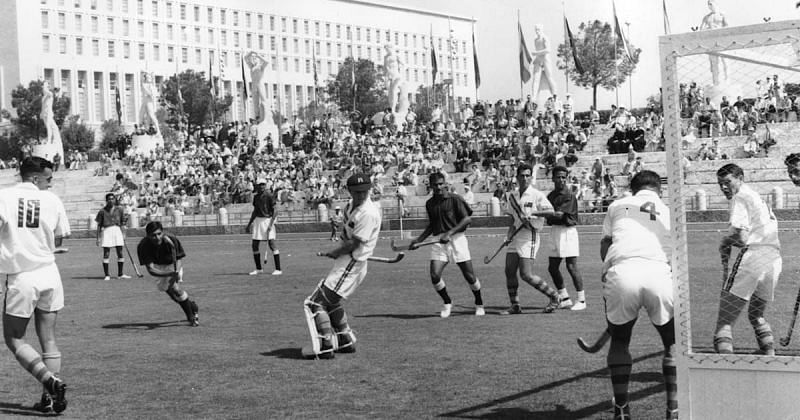
Know your Olympics - Rome Olympics 1960
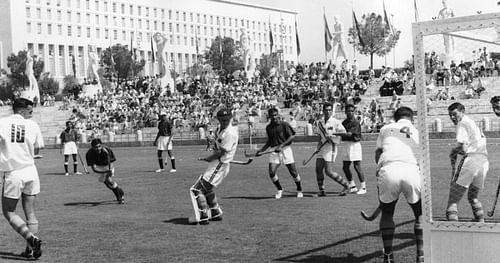
Rome was first chosen to host the Olympics in 1908. However, the volcanic eruptions of 1906 denied them the honors. They finally had their chance in 1960.
If the Helsinki Games were one of the coldest Summer Olympics, Rome went the other way. Temperatures ran as high as 40 degrees celsius during the event. This was excruciating for both athletes and spectators.
The 1960 Olympics saw the rise of Wilma Rudolph and the tragic death of Knud Jensen. A new hero emerged in Abebe Bikila, while India had its own share of heartbreak in sprint and hockey.
Perhaps the biggest legend was born in the heavyweight boxing category. An American named Cassius Marcellus Clay junior won the event in style. Yes, you guessed it - the star boxer MUHAMMMAD ALI!
The Rome Olympics also saw the wilting of Indian hockey. The men's team had won six consecutive golds since 1928. As an independent nation, they completed a hat-trick in 1956.
In Rome, they were the obvious favorites. Leslie Walter Claudius, the Anglo-Indian legend, was playing in his fourth and final Olympics.
Sadly, Leslie did not get the farewell he deserved. In a repeat of Melbourne, India played Pakistan in the finals. Into the 6th minute, Naseer Ahmad Bunda slipped a shot smartly into the Indian goal. The Indians never recovered from that deficit. Pakistan halted India's golden trot. India returned with a silver.
Here are some interesting facts about the Rome Olympics of 1960.
#1 The Rise of Wilma Rudolph
![Wilma Rudolph [centre] - Triumph of Spirit over Adversity at Rome Olympics](https://staticg.sportskeeda.com/editor/2021/07/39d62-16261797483576-800.jpg)
Betty Robinson was once considered the symbol of triumph over adversity. However, Wilma Rudolph went a step further at the Rome Olympics. An African American athlete, she did in Rome what Jesse Owens did at Berlin 1936.
Her journey was tougher. Discrimination aside, Wilma suffered from polio as a child. However, she overcame that illness to join the American team as a sprinter.
At the Melbourne Olympics, she failed to make a significant mark. Yet she salvaged some pride with a respectable bronze in the women's 4x100 meter relay.
The Rome Olympics was different. Wilma competed in the 100- and 200-meter sprints, as well as the 4x100-meter relay. She won all of them, becoming the first American and African American woman to win three golds in a single edition.
Wilma ran the finals of the 100-meter dash in a wind-aided time of 11.0 seconds. She won another gold in the 200-meter dash with a time of 24.0 seconds, after setting a new Olympic record of 23.2 seconds in the opening heat. Despite the grueling heat, she also helped her team win the 4x100-meter relay with a time of 44.5 seconds.
#2 Cassius Marcellus Clay aka Muhammad Ali
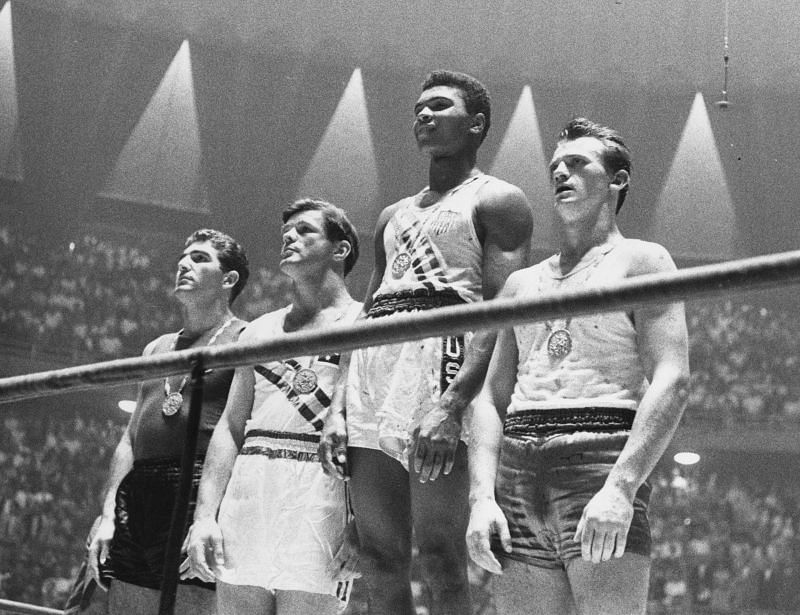
When a problem arises - there are two ways to tackle it. Either you run away from it, or you run with it and conquer it. Muhammad Ali chose the latter.
An African American boxer, Cassius Clay faced discrimination from the word go. However, he took to boxing to vent his anger. He was first directed toward boxing by Louisville police officer and boxing coach Joe E. Martin, who witnessed a young Cassius fuming over a thief who had pilfered his bicycle. When Cassius told the officer that he was going to "whup" the thief, Martin told Clay he had better learn how to box first.
Cassius began working with trainer Fred Stoner, whom he credits with giving him "real training." Stoner molded his style, stamina and system. Cassius Clay's amateur record was 100 wins with five losses. But it was at the Rome Olympics that he first emerged as a prominent boxer. He won gold in the light heavyweight division. A year later, he changed his name to Muhammad Ali.
#3 Abebe Bikila - The champion who ran barefoot
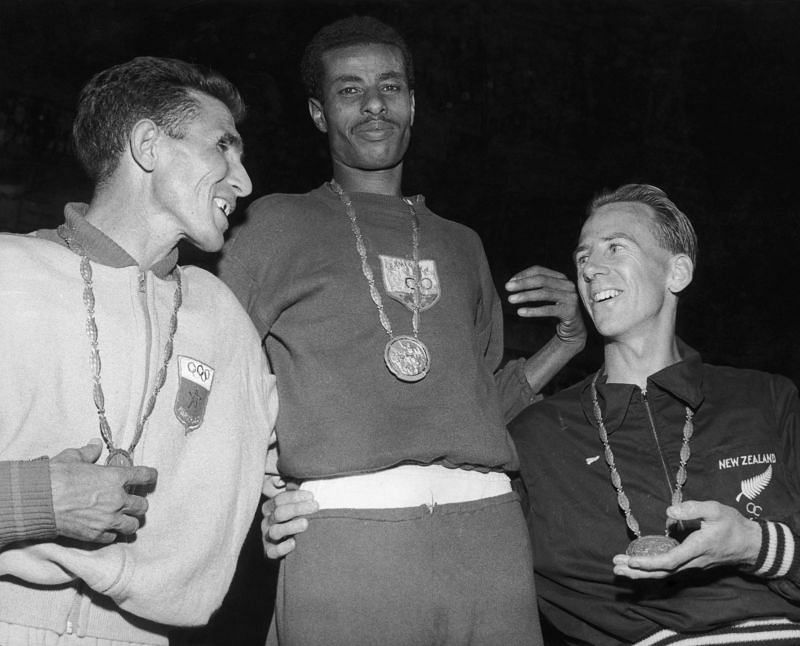
When challenges arise, champions say, 'Bring it on!'. Ethiopian runner Abebe Bikila was one such man. Before Bikila, the Olympic marathon was a European reserve. After Bikila, it was never the same again.
When Bikila was 20 years old, he joined the 5th Infantry Regiment of the Imperial Guards in Ethiopia. During the mid-1950s, Abebe ran 20 km (12 mi) from the hills of Sululta to Addis Ababa and back every day. His talent was spotted by Swedish coach Onni Niskanen, who began training him for the marathon. To quote his biographer Tim Judah, Bikila's entry into the Olympics was a "long-planned operation."
So how did Abebe end up running barefoot in the Olympic marathon? His running shoes had worn out. In Rome, he purchased new shoes, but they did not fit him and gave him blisters. Left with no other choice, Abebe ran barefoot on the cobblestones of Rome.
Abebe was not expected to win the marathon, but he did so in style. He clocked 2:15:16.2, a new Olympic record at the time. Funnily enough, immediately after crossing the finish line, Abebe began to touch his toes and "run in place" - he later said that he could have run another 10–15 km. He came back to Tokyo Olympics to successfully defend his title, but with shoes.
#4 Halt for Indian Hockey's Vijayrath
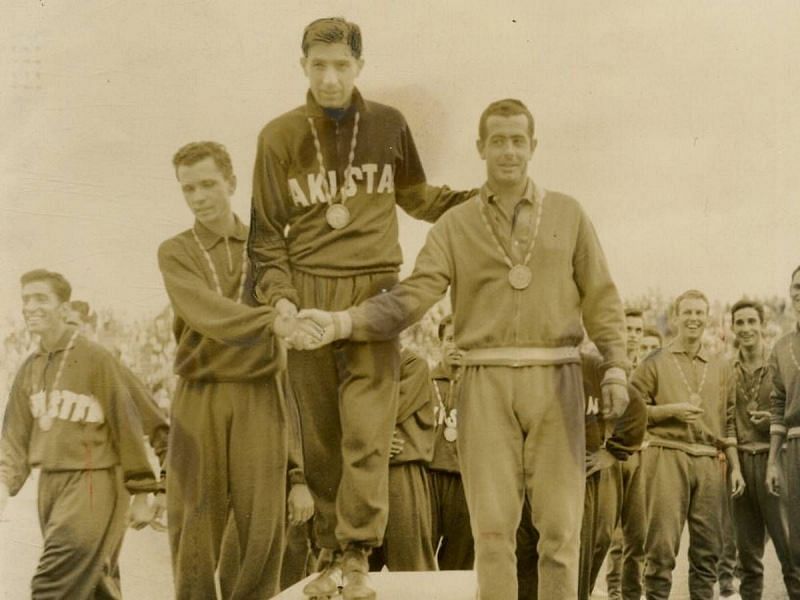
9 September 1960. A day no Indian sports lover would love to remember. If Milkha Singh's loss hurt, the loss of India at the hands of Pakistan was a heartbreak. The victorious chariot of Indian hockey finally came to a halt in Rome.
The Indian contingent landed in Rome as the hot favorites to win a record 7th title. They acted like it, conceding just one goal until the semifinals. Here they met Great Britain. Udham Singh Kular scored the only goal of the match. India won by 1-0 to meet Pakistan once again in the finals.
Everything seemed fine. Team India were all set to give their skipper, Leslie Claudius, a golden farewell. Nothing could go wrong, or would it?
In the sixth minute of the match, Naseer Ahmad Bunda sneaked through the Indian defense. The skilful shot went past Shankar Lakshman, India's goalkeeper.
Pakistan had not just taken the lead, they had snatched the match. India tried hard to get back, but failed. For the first time, the Olympic medals were not handed out as jewels in a box, but to be worn around the neck. For India, the silver medal would be the reminder of a humiliating loss.
#5 The Great Tragedy of Milkha Singh
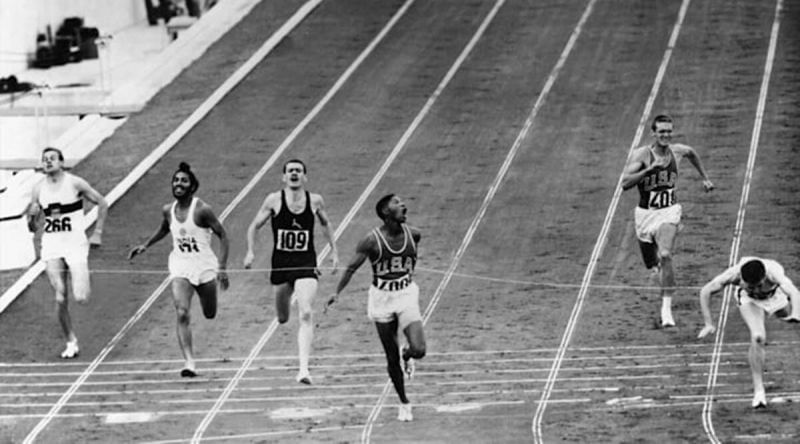
Men's 400 meters was one of the most anticipated events of 1960. German sprinter Carl Kauffmann was the top favorite to win gold. Then there was Otis Davis, a basketball player from the USA who was the surprise package.
And then there was India's Milkha Singh, who became the first Asian to break an Olympic record by clocking 45.8 seconds at a preliminary event in France. During the preliminaries, the three gave each other tough competition. Apart from Malcolm Spence of South Africa, none came close to them. Milkha qualified for the finals, equaling the Olympic record of 45.9 seconds, while Otis Davis did better with 45.5 seconds.
In the finals, the six runners broke off with tremendous speed. Milkha led at the curve of 250 meters, with Malcolm Spence close behind. However, Milkha slowed down towards the finish line. Otis Davis and Carl Kauffmann sped ahead, with the former setting a new world record of 44.9 seconds.
Even though Milkha Singh timed 45.6 seconds, he missed the bronze by one tenth of a second. He would regret it to the last moment of his life.